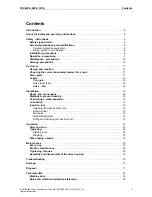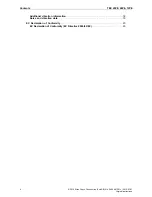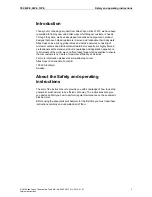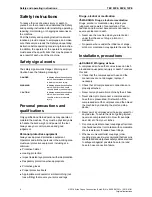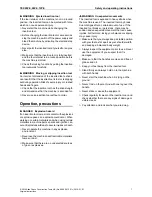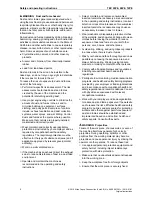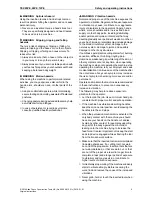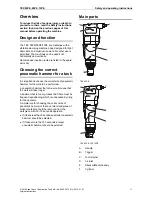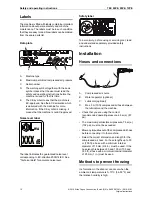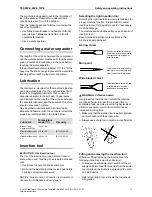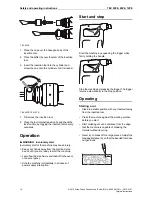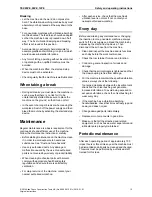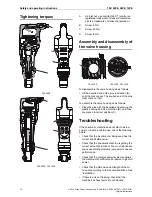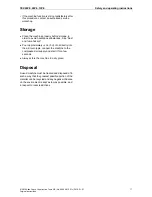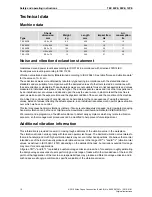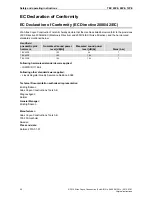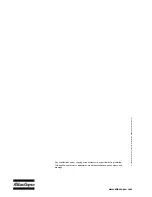
Breaking
♦
Let the machine do the work; do not press too
hard. The vibration-absorbing machine body must
absolutely not be pressed all the way down to the
base.
♦
For pneumatic machines with vibration-absorbing
machine bodies: The feed force should be adapted
so that the machine body is pressed down 'half
way'. The best vibration damping and breaking
effect is achieved at this position.
♦
Avoid working in extremely hard materials for
example granite and reinforcing iron (re-bar) which
would cause substantial vibrations.
♦
Any form of idling, operating without insertion tool
or operating with an uplifted machine must be
avoided.
♦
When the machine is lifted, the start and stop
device must not be activated.
♦
Check regularly that the machine is well lubricated.
When taking a break
♦
During all breaks you must place the machine in
such a way that there is no risk for it to be
unintentionally started. Make sure to place the
machine on the ground, so that it can not fall.
♦
In the event of a longer break or when leaving the
workplace: Switch off the power supply and then
bleed the machine by activating the start and stop
device.
Maintenance
Regular maintenance is a basic requirement for the
continued safe and efficient use of the machine.
Follow the maintenance instructions carefully.
♦
Before starting maintenance on the machine, clean
it in order to avoid exposure to hazardous
substances. See “Dust and fume hazards”
♦
Use only authorised parts. Any damage or
malfunction caused by the use of unauthorised
parts is not covered by warranty or product liability.
♦
When cleaning mechanical parts with solvent,
comply with appropriate health and safety
regulations and ensure there is satisfactory
ventilation.
♦
For major service of the machine, contact your
nearest authorised workshop.
♦
After each service, check that the machine's
vibration level is normal. If not, contact your
nearest authorised workshop.
Every day
Before undertaking any maintenance or changing
the insertion tool on pneumatic machines, always
switch off the air supply and bleed the machine by
depressing the start and stop device. Then
disconnect the air hose from the machine.
♦
Clean and inspect the machine and its functions
each day before the work commences.
♦
Check the tool retainer for wear and function.
♦
Conduct a general inspection for leaks and
damage.
♦
Check that the air inlet nipple is tightened and that
the claw coupling is free from damage.
♦
For the machine to maintain the specified vibration
values, always check the following:
Too large a clearance between the insertion tool’s
shank and the chisel bushing will generate
increased vibrations. To avoid being exposed to
excessive vibrations, check the chisel bushing for
wear every day.
♦
If the machine has a vibration-absorbing
handle/handles, check that it moves freely (up and
down) and does not jam.
♦
Change damaged parts immediately.
♦
Replace worn components in good time.
♦
Make sure that all the attached and related
equipment, such as hoses, water separators and
lubricators are properly maintained.
Periodic maintenance
After each operating period of approximately 100
impact hours or three times a year the machine must
be dismantled and all parts be cleaned and checked.
This work must be performed by authorized staff,
trained for this task.
15
© 2010 Atlas Copco Construction Tools AB | No. 9800 0812 01c | 2010-01-01
Original instructions
Safety and operating instructions
TEX 05PE, 09PE, 12PE



